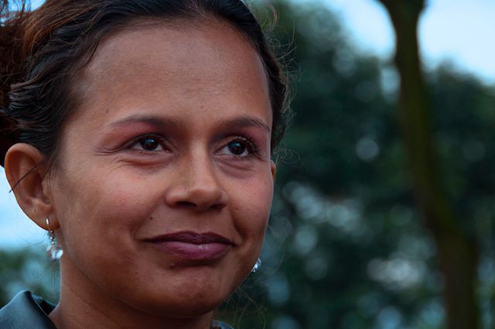Mayerlis Angarita, Planting and Healing
From words to actions to restitute the rights of women survivors in Colombia.Date:

Mayerlis Angarita reflected in his face and in her speech that contagious joy that is typical of the inhabitants of the surrounding savannas of the Caribbean Sea in Colombia, but his voice keeps cracking when he remembers the difficult times he has been through her community, her family and herself.
"It is a struggle that allows us to grow as women and society at the local, because that's where territory, where the foundations of society are built" said Mayerlis, a survivor of the armed conflict in northern Colombia, conflict which began in the late 40s between guerrilla and traditional political parties, but that was sharpened by the rise of drug trafficking and the emergence of paramilitary groups in the late twentieth century.
Even as a child Mayerlis had to suffer the loss of his mother, a peasant leader of the Department of Córdoba. This forced his father to flee amid threats and harassment to seek a more peaceful future, though uncertain, their children.
Today the word power of storytelling and the recovery of collective memory as a mechanism for healing of the traces left by the armed conflict, has been the main tool that is leader of the Narrating Foundation for living found for overcome his injuries.
With an innate leadership fueled by the scars of war in his life as a teenager Mayerlis began to be part of community and regional processes for the vindication of human rights and understood the importance of telling the memory, however painful this was for continue living.
So in group with other women leaders of the region were given the task of planting a field of corn, a cultivated field became space for ongoing dialogue to tell their stories of life, difficulties that had been women go through as survivors of the armed conflict, as in many cases displaced as single mothers, widows or as orphans.
Discuss and share became a healing experience in which the words and advice of some became the best tool to rebuild a life for others, in which human rights knowledge, leadership or empowerment were the way to recover their faith in themselves and in the exercise of community development.
It was from this conference that was born in 2004 Narrating Living Foundation, an organization that gets the historical memory of women survivors of conflict. Telling to Live in 2007 started a joint work with UNDP and UN Women (then UNIFEM), through the participation of several of its members, including Mayerlis in a Diploma of Building and Empowerment of Women.
"Before meeting UN Women she came with a leadership process, but I think women have always though that spark of empowerment, if we do not support, we can not achieve the goals we set for ourselves" says Mayerlis.
"In that sense, I can say that has been the key for me and the organization work with UN Women, because being a leader just now I became sure of my rights, empowered leader how I can claim them for myself, my community and for other women."
UN Women, through Truth, Justice and Reparation for Women Victims of Armed Conflict in Colombia program carries out a project which, in addition to support for organizational strengthening, has provided forums for these women to the country will have their realities, their initiatives and ideas, many of which were included in the Victims and Land Restitution approved by the Colombian Congress in 2011 and which became operational in January 2013.
Narrating currently living survivors gathers 840 women victims of Montes de María area and Mayerlis leads, with the support of UN Women and other agencies of the UN system in Colombia, the process for the return of land to women were stripped during the armed conflict.
Despite the fear and the constant threats on his life, including a recent attack that was unharmed, Mayerlis has a clear mission: "to get to the woman who is in the last village and say, you should do this because this is the route will garantee you access to minimum justice,and land".